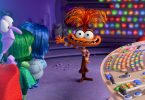In the comics, the Joker has no definite origin story. He’s an enigma who goes on to become one of entertainment’s greatest supervillains, often referring to his past as “multiple choice” like in The Killing Joke or tailoring his story of how he got his scars depending on who he’s talking to in Christopher Nolan’s The Dark Knight. He believes that people are one bad day away from becoming just like him. That’s all it takes. Joker depicts that one bad day for Arthur Fleck as it tells the origins of the man who would become the Clown Prince of Crime. Carried by a commanding, Oscar-worthy performance by Joaquin Phoenix in the titular role, Joker explores the darkest aspects of society and offers a window into the mental breakdown of a man who is pushed passed his breaking point.
Life has not been kind to Arthur Fleck (Phoenix). Working part-time as a clown-for-hire, Arthur has dreams of becoming a standup comedian but is always seen as the weird person in the room and makes people feel uncomfortable with his bouts of uncontrollable laughter at inappropriate times. Most of the time, however, he’s invisible to the rest of society. After a series of events in which Arthur is fired from his job and he loses access to his medication because Gotham’s social service program is shutting down, his anger at those around him begins to bubble to the surface. Arthur finally snaps and takes his frustrations out on a group of Wall Street businessmen who were harassing him, killing them and setting in motion protests all across Gotham against the wealthy. As the situation escalates, Arthur becomes more and more violent as he embraces the resentment he’s had his whole life. For once, he finally feels seen by the world.
Joker is a comic book movie that feels neither super nor heroic in any manner. It’s one man’s descent into madness and chaos. The beginning of the film is as good as things are going to be for Arthur, and then from there it’s just one bad thing after another. Director Todd Phillips wants you to see what can drive a person to become as villainous as the Joker, and he shows it to audiences in devastating detail. The main problem with the film is that it doesn’t go much further than that. Joker doesn’t offer up any insight into the destruction, only that we’re supposed to accept it at face value. We’re supposed to accept that Arthur does all of these despicable acts of violence because society has failed him, because he’s been fired, because he’s off his meds, because he’s been mocked his whole life. In justifying his actions, the film balances on the line between glorifying violence and denouncing it.
In today’s political climate where mass shootings happen on a near weekly basis, it’s impossible to ignore the connections the film brings up with mental health and the whole loner mentality. I believe Joker is a good jumping off point to continue a discussion about these topics, although I feel it could have done a better job at shining a stronger light onto them and actually explore them deeper rather than just throw them out there to be interpreted any which way. There’s no doubt that the film is going to be divisive in its depiction of mental health, however, in the end I feel it’s a net positive.
Politics aside, Joaquin Phoenix delivers a captivating and unnerving performance as Arthur Fleck. The way he twists and contorts his gaunt frame is both disturbing yet intriguing. As a man, Arthur is broken and disturbed, but you can see a transformation in him when he finally puts on the Joker makeup. His performance is unlike any of the other versions we’ve seen on screen. He’s more of a person than a comic book villain, which grounds the film and makes it more realistic, which in turn makes the violence depicted all the more disturbing as well. Phoenix lays his mental state out on the line for all the world to see, and it’s difficult not to get caught up in his act.
Make no mistake, Joker is a film about a man named Arthur Fleck; it’s not about the Joker, although it has the beginnings of the character present. Don’t expect the criminal mastermind of the Batman movies. This isn’t that kind of film. Honestly, you could take the Joker persona and the few Batman references out of the film entirely, and it would still work as a character drama. Although I would have liked to see more of solution as to how to combat the issues the film presents, Joker is a conversation starter about how mental health is no laughing matter and for that I see it as worth watching.
-
Joker
Summary
In the comics, the Joker has no definite origin story. He’s an enigma who goes on to become one of entertainment’s greatest supervillains, often referring to his past as “multiple choice” like in The Killing Joke or tailoring his story of how he got his scars depending on who he’s talking to in Christopher Nolan’s The Dark Knight. He believes that people are one bad day away from becoming just like him. That’s all it takes. Joker depicts that one bad day for Arthur Fleck as it tells the origins of the man who would become the Clown Prince of Crime. Carried by a commanding, Oscar-worthy performance by Joaquin Phoenix in the titular role, Joker explores the darkest aspects of society and offers a window into the mental breakdown of a man who is pushed passed his breaking point.







